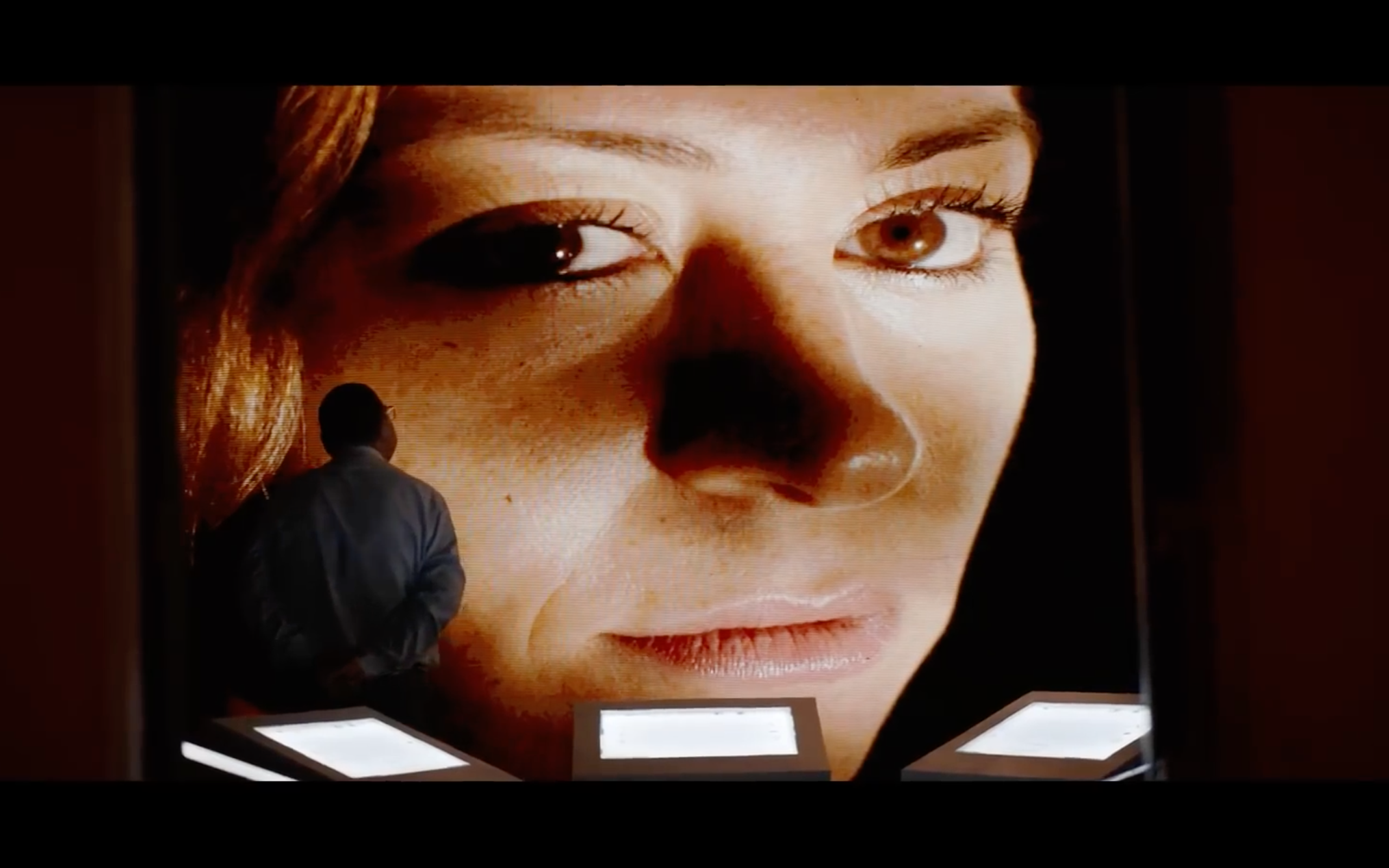
April 26, 2021
Al Asleyeen
Hazem Fahmy
This text is presented as part of the Mizna Film Series, a monthly selection which expands our regular film programming to include screenings, critical essays, filmmaker interviews, and discussions exploring revolutionary forms of cinema from the SWANA region and beyond.
Any discussion of Marwan Hamed and Ahmed Mourad’s 2017 film must begin with language. How do you translate الأصليين?—the possibilities speak to the layered meanings the word holds. “The originals” and “the natives” are both options. Normally, I would just tell you to figure it out based on the context. Are we talking about material objects––let’s say clothing––prone to fraudulent duplication? Then certainly it’s the former: أصلي as in original, original as in authentic. But what if we’re discussing living, breathing people? أصلي as in indigenous would make sense, certainly, but so too would أصلي as in original, original as in authentic––say, a genuinely patriotic citizen whose loyalty to the state is sincere. The context is inherently ambiguous and this is an ambiguous film.
The subtitles for this version of Al Asleyeen reflect the former option: “the originals.” In this story, “the originals” refers most obviously to a specific, yet shadowy, group that our protagonist, Samir ‘Eliwah (Maged el-Kedwany), encounters. They emerge out of the shadows, sending the monotony of his westernized bourgeois lifestyle into chaos. It all begins when Samir receives a mysterious phone in the mail, on which he finds impossible video footage of himself and his family. Turns out, Samir has been intimately and obsessively surveilled his entire life. When he finally meets the face of the operation, a man who goes by the legendary actor’s name, Rushdy Abaza (Khaled el-Sawy), he asks him––repeatedly––why his life has been so closely scrutinized for so long.
Rushdy has no answer––at least no clear one. He waxes poetic about the need to “protect” the nation, “the originals” being some kind of underground Egyptian illuminati that’s simply trying to “look out” for the country. What that actually entails remains a mystery by the time the credits roll. The surveillance operation of “the originals” is not a tool towards a larger goal, but the fundamental goal itself. Their mantra, “everyone is being watched,” is repeated ad nauseum throughout the film. Toward the end, Samir finds out that even Rushdy is being surveilled by his superiors. No one can escape.
In a sense, the act of surveillance becomes divine. Rushdy puts it plainly himself, “God from heaven watches his servants. We are just humans imitating him.” By this logic, the act of watching is not only necessary, it is holy. Rushdy’s religious view of surveillance is further emphasized in two scenes: when he has Samir meet him at a Sufi inshad and a Coptic mulid, respectively. Rushdy’s attraction to sites that are simultaneously festive and of different religions confuses Samir, who asks him: “so what are you?” Rushdy quickly retorts with the popular secular-nationalist axiom, “Religion is for God and the nation is for everyone.” Here, we get to the real meat of his worldview.
Rushdy’s “Egypt” is primordial; whatever shape or form, the nation is a static entity that supersedes anyone or anything that may lie within it. For Abaza and his ilk, “Egypt” is not whatever “Egyptians” say it is, but rather a definite and definable thing––both knowable and unchanging. Rushdy says he seeks to protect the “original land,” but does not establish what its parameters are exactly. The only conclusion his vagueness leaves is that the modern nation state, despite its fundamental modernness, is actually ancient, little more than the contemporary manifestation of that singular arc which began with the “Pharaohs” long ago. The woman Samir is tasked with surveilling, Soraya (Menna Shalabi), is also incapable of letting go of a romanticized past. She is obsessed with the supposed mystical qualities of the lotus flower, and believes that it is precisely what granted the Ancient Egyptians their almost-mythical civilization. Rushdy leads Samir to believe that her work is dangerous, but doesn’t explain precisely how. The stakes are high, yet unclear.
The romanticization of the ancient is a common tactic of nationalists across the world, as Benedict Anderson demonstrated in his landmark Imagined Communities. As a portrait of a bona fide Egyptian nationalist, Rushdy is by no means unique, not even in the landscape of Egyptian cinema. Across all different mainstream genres, popular Egyptian films, and especially in the aughts, have made a habit of taking convoluted detours to let a patriotic, usually patriarchal, character wax poetic about the nation, its glorious past, and the protagonist’s role within it. The invocation of the past can and has shown up in everything from comedies like The Headmaster (2000) to action-thrillers like Mafia (2002).
Marwan Hamed’s own filmography prior to Al Asleyeen is no exception; often attempting to synthesize a concrete sense of “Egyptianness” through the convergence of plot, character, and mise-en-scene. This is, after all, the same director who first became famous for his 2006 adaptation of The Yacoubian Building, easily one of the most heavy-handed cinematic metaphors for “Egypt” in modern film. But rarely is the nation so transparently central to the plot of such films, as in Al Asleyeen. Even rarer is the patriotic patriarch who inspires genuine fear in the heart of the protagonist. Rushdy’s watchful eye doesn’t exactly help Samir sleep better.
In 2017, the theme of surveillance loomed large in Egyptian media. In addition to el-Aslyeen, that year gave us the critical darling This Evening, a Ramadan ensemble-drama currently streaming on Netflix in the US. In contrast to the conspiratorial world of el-Aslyeen, surveillance in This Evening functions on a scale that is at once smaller and far more devastating. One of the main characters we follow, for example, is a predatory and abusive phone shop clerk named Sonny (Mohamed Farag) who takes delight in hacking the phones of his clients for sensitive material, much of which he then uses to extort them. Here, surveillance is targeted, gendered, and charged with more explicit nefarious ends. Throughout the series, we learn of other mobile store employees and owners who abuse their access to people’s data to threaten and stalk them. Here, it is not a shadowy and mysterious group that commits this violence, but rather the catastrophic convergence of predation with technology.
Both works skirt around the issue of state surveillance because they have to. In The Originals, the shadowy group is an obvious shorthand for the state; in This Evening, the state is ostensibly irrelevant. For example, in a fleeting scene from the latter, Toqa (Asmaa Abul-Yazid), a woman being blackmailed by a hacker, goes to the cops seeking help. They make it plain that they couldn’t care less. Though sadly less these days, Egyptian media has over the last few decades frequently commented on, or at least gestured toward, the rampant violence and abuses of the police. Much rarer though is the text that honestly and accurately depicts the violence of the cops’ apathy, their fundamental uselessness. The cyberstalking and coercion that Toqa endures are heinous, but so too is the abject failure of the state to do anything about it. She has the blackmailer’s phone number, making the culprit easily catchable for any police force with a well-developed surveillance apparatus. Yet, it is clear from the moment she walks into that station that the cops are not an option. The surveillant will never help the surveilled.
In Al Asleyeen, Rushdy assures Samir that “the originals” want nothing but to protect Egypt––from what though? What threat could possibly require such a terrifyingly wide-reaching surveillance apparatus? Perhaps this is a gesture toward the dangers we only imagine: what actual violence do we justify when we imagine theoretical threats? In between watching Al Asleyeen and This Evening, I was reminded of the morbidly statist series Qabeel (2019), which embraces real state surveillance as a necessary solution to a completely fictional problem.
Basking in a litany of neo-noir tropes, Qabeel follows Tarek (Mohamed Mamdouh), a detective reeling from the death of his wife, as he attempts to catch a mysterious Cairene serial killer. The show had an acute awareness of its own plot’s detachment from the reality of violence in Cairo. Several characters even comment on it explicitly, practically winking at the audience while they point out the sheer unlikelihood of such an occurrence. This in itself is, obviously, not the problem. We do not turn to fiction for a 1:1 reflection of reality. Critiquing fiction on the simple basis that it’s “unrealistic” is boring. But unrealism is rarely banal. It is overwhelmingly a kind of statement on reality. Masked serial killers are not exactly common in Egypt, but police surveillance is. And yet, Tarek gets nowhere without this surveillance. In the series’ fictional universe, a violence in our world becomes benevolent. You’re glad the cops have such good hardware; you’re glad they are able to catch a serial killer that does not exist.
Mohamed Mamdouh also appears in Al Asleyeen. He is Samir’s proxy employer at the telecommunications company that acts as a front for “the originals.” He sets Samir up in a room whose walls are screens, at the center of which is a futuristic computer terminal. The space evokes Professor Xavier’s Cerebro, the device used in the X-Men comics and films to enhance the telepathic mutant’s detection abilities. And what a sharp evocation it is. After all, does Samir not become, in a sense, psychic? As he snoops on the most intimate details of Soraya’s life, watching her when she thinks no one is, is he not practically reading her mind?
The end of Samir’s story is ambiguous, uninterested in providing a definitive conclusion to his journey down the rabbit hole. The film, too, is uninterested in providing conclusive answers to the broad questions it gestures toward. It does, however, connect seemingly disparate dots, allowing us to think a little more robustly about the relationship between the nation, state, and the eye of the surveillant. Like much of Marwan Hamed’s work, it is steeped in a fundamentally nationalist attempt to distill the essence of “Egypt” into a handful of iconographic moments, which severely limits its capacity at self-examination and introspection. But this is where our role as viewers kick in. After all, fighting surveillance begins with a critical eye.

Hazem Fahmy is a Pushcart-nominated writer and critic from Cairo. He runs Zam Zoum, a monthly media criticism newsletter on Substack. He is currently pursuing his MA in Middle Eastern Studies and Film Studies from the University of Texas at Austin. His debut chapbook, Red//Jild//Prayer won the 2017 Diode Editions Contest. A Kundiman and Watering Hole Fellow, his poetry has appeared, or is forthcoming in Apogee, AAWW, The Boston Review and The Offing. His performances have been featured on Button Poetry and Write About Now.












